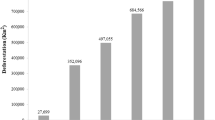Abstract
South Korea launched a national carbon-trading scheme (including forestry carbon offsets) in January 2015 to stimulate corporate efforts in reducing carbon emission. South Korean enterprises are under an obligation to search for offset forests, and North Korean forests represent a potential option. This study begins by identifying whether satellite imagery could be used for Forestry Voluntary Carbon Market in North Korea by interdisciplinary interpretation. Close interaction between social science and remote sensing discipline examined negotiation monitoring target such as government failure for deforestation control and calculating opportunity cost, and seek out matches between the technical capabilities of satellites and monitoring negotiation requirements. The second part of this study presented referential variables, stakes and chips of negotiation such as measurement, reporting and verification enforcement methodology, types of forest carbon markets and human rights-based approach as springboards to prepare for intergovernmental dialogue with North Korea. This research could be a valuable reference for utilizing the capabilities of satellites in monitoring negotiation with North Korea by suggesting realistic interdisciplinary interaction between remote sensing and social Science.





Similar content being viewed by others
Notes
There are two forest carbon markets: the regulated (or compliance) market and the voluntary market. The compliance market is typically operated by the Afforestation/Reforestation-Clean Development Mechanism (ARCDM) and the United Nations Programme on Reducing Emissions from Deforestation and Forest Degradation in Developing Countries (UN-REDD). The voluntary market is evolving, mainly driven by the private sector and consumer interest (e.g., corporate social responsibility). Both operations regulate activities taking place under international negotiations through the United Nations Framework Convention on Climate Change (UNFCCC).
Christian Tomuschat, Human Rights Between Idealism and Realism, Second Edition (Oxford: Oxford University Press, 2008), pp. 7–8.
According to the “DPRK Land Law”, adopted in 1999, land use is categorized into six main types (agricultural, residential, industrial, forest and riparian, and other) and the master plan for land development governs proper use and development of the land.
‘Green Detente' is to implement cooperation in environmental areas first as they are politically less sensitive relatively and to mitigate confrontation and conflicts between South and North Korea, and promote peace and co-prosperity.
Leakage refers to the fact that while deforestation might be avoided in one place, the forest destroyers might move to another area of forest or to a different country.
RBA is a conceptual policy framework for the process of human development that is normatively based on international human rights standards and operationally directed to promoting and protecting human rights. RBA seeks to analyse inequalities which lie at the heart of development problems and redress discriminatory practices and unjust distributions of power that impede development progress.
Reference
Choi, K. S., & Ha, S. A. (2011). A study on supporting policy for the Voluntary Carbon Market. Journal of the Environmental Sciences, 20(2), 207–214.
Kim, J. W., & Um, J. S. (2013). Comparative evaluation between administrative and watershed boundary in carbon sequestration monitoring: Towards UN-REDD for Mt. Geum-gang of North Korea. Environmental Impact Assessment, 22(5), 1–16.
Bae, J. S. (2013). A preliminary review of REDD mechanism for rehabilitating forest degradation of North Korea. Journal of Korean Forest Society, 102(4), 491–498.
Han, K. J., & Youn, Y. C. (2007). An economic feasibility study of AR CDM project in North Korea. Journal of Korean Forest Society, 96(3), 235–244.
Joo, S. M., & Um, J. S. (2014). Evaluating MRV potentials based on satellite image in UN-REDD opportunity cost estimation: A case study for Mt. Geum-gang of North Korea. Journal of Korea Spatial Information Society, 22(3), 47–58.
Engler, R., Teplyakov, V., & Adams, J. (2014). An assessment of forest cover trends in South and North Korea, From 1980 to 2010. Environmental Management, 53(1), 194–201. doi:10.1007/s00267-013-0201-y.
Youn, Y. C. (2007). Current Condition of deforestation of North Korea and comprehensive afforestation direction. The First Forest Forum.
FAO. (2011). State of the world’s forests. Rome: FAO.
Zartman, I. W., & Rubin, J. Z. (2003). Power and negotiation. Ann Arbor: The University of Michigan Press.
Admiral Joy, C. T. (1970). How communists negotiate. New York: Santa Monica Fidelis Publishers, The Macmillan Company.
DMZ Academic Institute. (2013). Environmentally United Nation through Green Detente. Seoul: Ministry of Unification.
IPCC. (2006). 2006 IPCC guidelines for national greenhouse gas inventories.
Estrada, M. (2011). Standards and methods available for estimating project-level REDD + carbon benefits: Reference guide for project developers. CIFOR Working Paper, 52.
UN-REDD. (2011). Final report: Analysis of opportunity cost for REDD + . UN-REDD Programme.
Diaz, D., Hamilton, K., Johnson, E., Kandy, D., & Peters-Stanley, M. (2011). State of the forest carbon markets 2011: From canopy to currency. Ecosystem Marketplace.
Joo, S. M., Heo, M. H., Kim, J. D., & Um, J. S. (2015). Evaluating monitoring condition for forest carbon offset project to demonstrate CSR in North Korea. Journal of Korea Spatial Information Society, 23(2), 1–10.
Jeong, B., & Um, J.-S. (2016). Comparative evaluation of South versus North Goseong County in terms of forest carbon offset potential. Spatial Information Research, 24(1), 1–10. doi:10.1007/s41324-016-0001-6.
Heo, M. H., Um, J. S., Kim, J. D., & Kim, M. R. (2015). Negotiations with North Korea on Forest Carbon Offset: From a perspective of control and human rights. Journal of International Relations, 18(1), 261–288.
Acknowledgments
This research was supported by Kyungpook National University Research Fund, 2016. We thank NASA (National Aeronautics and Space Administration, United States) for providing satellite data.
Author information
Authors and Affiliations
Corresponding author
Rights and permissions
About this article
Cite this article
Um, JS. Monitoring negotiation strategy for Forestry Voluntary Carbon Market with North Korea. Spat. Inf. Res. 24, 555–563 (2016). https://doi.org/10.1007/s41324-016-0052-8
Received:
Revised:
Accepted:
Published:
Issue Date:
DOI: https://doi.org/10.1007/s41324-016-0052-8




